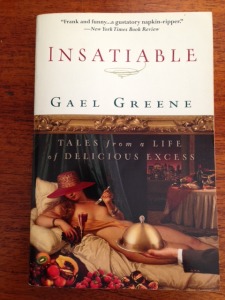Book Review: “Insatiable” Gael Greene
by Jan
At the end of this book, subtitled Tales from a Life of Delicious Excess, there is a list of discussion questions. Presumably, this is aimed a book groups. I will attempt to wrestle with some of these:
1. Ultimately, Insatiable is about more than food, restaurant reviews, and sexual encounters. It is about a woman who reinvents herself. What are Gael Greene’s strengths and weaknesses, and how does she use both in creating her persona?
Greene’s weakness is that she gives too much information; her strength is that her writing style is very readable. The result of this is that Insatiable is a reinvention of herself: a woman with a voracious appetite for food and sex, and then telling everyone about it. Unfortunately the persona does not seem to have a lot of personal awareness about how she embarrasses herself.
7. What qualities does Gael Greene value when she reviews a restaurant? Can you construct “guidelines” a la Gael Greene? If you choose one of your own favourite restaurants (or a popular franchise) and reviewed it from a “Gael Greene” point of view, would it be a pick or a pan?
From reading Insatiable it seems that Green’s guidelines would likely be:
- Namedrop as much as possible, reveal who’s who and if they are seated “in Siberia”
- Be on intimate terms with the chef, and don’t worry about the neutrality of the review, or conflict of interest.
- Eat and drink only the most luxurious items on the menus
- Don’t worry too much about culinary technique, or the provenance and production of the primary products.
If I reviewed a top Sydney restaurant from a Greene pint of view it would be a pan. The main reason for this is in 2013 there are not too many restaurants which serve foie gras and truffles. And not too many customers want this, or to have it washed down with expensive champagne. That all seems a bit dated now.
Also, in a city like Sydney reviewing from the Greene point of view would result in derision and loss of reputation. One wouldn’t get away with that type of behaviour emanating from an oversized ego.
8. Gael Greene talks about being a “foodie” and about “foodism”. What does she mean? What evidence can you point to that we have become a nation of “foodies”?
It seems that in the 80s “restaurant madness had New York in a frenzy”. Restaurants became used more sophisticated and unusual ingredients and drew inspiration from more cuisines. Foodies, according to Paul Levy’s Official Foodie Handbook, are “all palate, with a vestigial person attached”.
Eating out increased. People learnt what brand names to remember, what new foods to consume, what chefs worked where and how many stars they had.
But not many of these consumers learnt how to cook it themselves. So the foodism wasn’t based on solid knowledge or experience.
9. When you next dine out, will you view the experience any differently after reading Insatiable? If so, what specifically will you be paying more attention to?
Probably not very much more. But if I did I would look at all aspects of eating out, and not be too concerned about what had happened to it before it arrived on the plate. That is, the décor, the chef’s background and reputation, and the crowd.
11. For Gael Greene, food and sex are inextricably linked. What do both hungers have in common – for Gael or for anyone?
Food and sex are linked in that some have appetites for plenty of one, or the other, or both. I think these hungers may have something to do with unmet needs. Obviously the body needs fuel to stay alive, but maybe an insatiable hunger for sex is related to the need for emotionally intimacy. That’s obviously idle speculation.
This issue was best summed up in John Newton’s review of Insatiable in the Sydney Morning Herald on 28/4/07.
16. Do Insatiable and Gael Greene deserve a place among the gastronomic classics? From the writing to the content, what puts this book a cut above the rest?
This book does not really deserve a place among the gastronomic classics.
